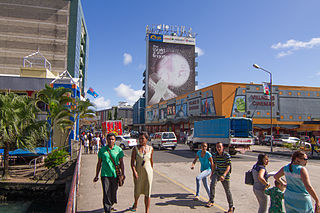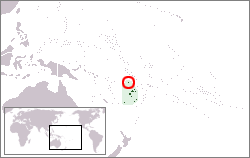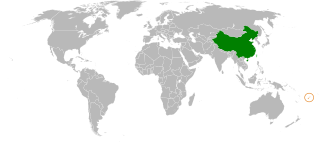
Suva is the capital and largest city of Fiji. It is the home of the country's largest metropolitan area and serves as its major port. The city is located on the southeast coast of the island of Viti Levu, in Rewa Province, Central Division.

Rotuma is a self-governing heptarchy, generally designated a dependency of Fiji. 'Rotuma' commonly refers to Rotuma Island, the only permanently inhabited and by far the largest of all the islands in the Rotuma Group. Officially, the Rotuma Act declares that Rotuma consists of Rotuma Island as well as its neighbouring islands, rocks, and reefs across the entire Rotuma Group. The dependency is situated around 500 km west of the French islands of Wallis and Futuna and a similar distance north of the Fijian mainland. Its capital is Ahau, a hamlet consisting of a number of colonial-era buildings. Rotuma exists as a dependency of Fiji but itself contains its own socioreligious pene-enclave known traditionally as Faguta where the chiefs and their villages adhere to the practices of worship, festival dates, and French-based writing system of the Marists. Faguta's special character was effectively agreed to by all Rotuma's chiefs in 1871 in the Treaty of Hamelin.

Since becoming independent of the United Kingdom in 1970, Fiji has had four constitutions, and the voting system has changed accordingly.
The 1997 Constitution of Fiji begins with a Preamble, which sets out the historical, cultural, and political reasons for the drafting of the 1997 Constitution.
Fijians are a nation and ethnic group native to Fiji, who speak Fijian and English and share a common history and culture.
Fiji is divided administratively into four divisions, which are further subdivided into fourteen provinces. Each province has a provincial council.
The Council of Rotuma is a municipal body on the island of Rotuma, a Fijian dependency. Owing to the unique character of Rotuma, the powers of this council are greater than those of other municipal bodies in Fiji and in some ways it approximates a legislative body, though it is in every way subordinate to the Parliament of Fiji.
Taniela (Daniel) Vafo'ou Fatiaki CF was the Chief Justice of Fiji from 1 August 2002, when he succeeded Sir Timoci Tuivaga, till 5 December 2008. As Chief Justice, he presided over both the High Court and the Supreme Court, but was constitutionally barred from presiding over, or even sitting on, the Appeal Court. On 3 January 2007, he was sent on leave by the Republic of Fiji Military Forces, which had seized power on 5 December 2006. On 19 January, he was formally suspended, pending an investigation into allegations of misconduct. This investigation was dropped in December 2008 as part of a deal that involved his formal resignation.
Ratu Sir Lala Sukuna Day was a national public holiday in Fiji until the year 2010, when the Prime Minister, Commodore Voreqe Bainimarama, declared both Ratu Sir Lala Sakuna Day and National Youth Day to no longer be public holidays. It was originally celebrated annually on the last Monday of May, in honour of Lala Sukuna (1888-1958), the national father of modern Fiji, whose death anniversary falls on 30 May. The week leading up to Ratu Sukuna Day is marked by public celebrations with speeches and events, with an address from the President of Fiji on the closing day. Members of the public enter Parliament grounds to polish Sukuna's statue.
Injimo Managreve is a former Chairman of the Council of Rotuma, the legislative body for the Fijian island dependency which enjoys a considerable degree of local autonomy.
The Chinese diaspora in Fiji is a small but influential community in the multiracial society that makes up modern-day Fiji. In the early 2000s their numbers were estimated at around 6,000, or a little over half of one percent of Fiji's population. The most recent estimation puts the population at 7,500 making the concentration of Chinese in Fiji at around one percent. Around 80% of Chinese in Fiji speak Cantonese and around 16% speak Shanghainese as their native language. Chinese in Fiji also speak the local Fijian language. There are also a considerable number of Fijians who are of partial Chinese extraction, being descended from marriages between Chinese and indigenous Fijians.

Major-General Jioji Konousi "George" Konrote, is a Fijian politician and retired Major-General of the Fiji Military who served as the President of Fiji from 2015 to 2021. After commanding a peacekeeping mission in Lebanon, Konrote served as Fiji's High Commissioner to Australia from 2001 to 2006, as Minister of State for Immigration briefly in 2006, and as Minister for Employment Opportunities, Productivity and Industrial Relations from 2014 to 2015. He was the first non-iTaukei president, the first not to be a chief, and the first Seventh-day Adventist to be elected by parliament, as previous presidents were selected by the Great Council of Chiefs.
Gagaja is a Rotuman word denoting the position of "Chief" or "Lord". This could be a formal chiefly position in one of the seven districts or a village chief as well as to anyone else, such as the Chairman of the Rotuma Island Council to whom respect and deference is owed based on their own skills and attributes. Unlike in many other Pacific cultures, the official chiefly positions are not allocated according to any strict primogeniture, but rather are elected from all eligible males within certain kạinaga to whom the chiefly title belongs.
The Rotumans are a Polynesian ethnic group native to Rotuma, an island group forming part of Fiji. The island itself is a cultural melting pot at the crossroads of the Micronesian, Melanesian and Polynesian divisions of the Pacific Ocean, and due to the seafaring nature of traditional Pacific cultures, the indigenous Rotuman have adopted or share many aspects of its multifaceted culture with its Melanesian, Micronesian and Polynesian neighbours.
Fiji has three official languages under the 1997 constitution : English, Fijian and Fiji Hindi. The Fijian language is spoken as the first language by most indigenous Fijians who make up around 54% of the population.

The Republic of the Fiji Islands was the first Pacific Island country to establish diplomatic relations with the People's Republic of China, in 1975. China established an embassy in Fiji in 1976, and Fiji opened its embassy in China in 2001.

Severe Tropical Cyclone Bebe, also known as Hurricane Bebe, was a pre-season storm during October 1972 in the South Pacific Ocean that severely affected Fiji, the Ellice Islands, and the Gilbert Islands.

Severe Tropical Cyclone Tino was a tropical cyclone which itself and an associated convergence zone caused significant damage across ten island nations in the South Pacific Ocean during January 2020. First noted as a tropical disturbance during January 11, to the southwest of Honiara in the Solomon Islands, the system gradually developed over the next few days as it moved eastwards in between the Solomon Islands and Vanuatu prior to being named Tino as it approached Fiji during January 16. Continuing to track south-eastward, Tino continued strengthening as it passed near Fiji, bringing copious amounts of rainfall to the area. Whilst losing latitude, the system continued to strengthen and peaked as a category 3 tropical cyclone on January 17, with signs of an eye forming. Shortly after peak intensity, Tino was impacted by high wind shear and decreasing sea surface temperatures, triggering a weakening trend. Tino moved out of the tropics shortly thereafter and became an extratropical cyclone during January 19.

Solnohu or Sol Nohu, also known as Solnoho, Solnahu and Solnahou, is a small crescent-shaped uninhabited island in the Rotuma Group of Fiji. The island is of special importance in Rotuman and Tongan funerary customs.
Rotuman New Zealanders are Rotuman immigrants in New Zealand, typically from Rotuma Island or Fiji, their descendants, and New Zealanders of Rotuman ethnic descent. At the time of the 2018 New Zealand census, 981 people in New Zealand were surveyed as being of Rotuman descent.







